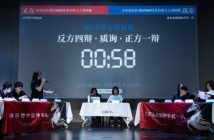
BHSFIC (which stands for Beijing No.4 High School International Campus) is an international campus affiliated with Beijing No.4 High School. Many people associate school in China with a rigid educational culture, but here at BHSFIC, the situation is completely different.
I spent three years studying in a public middle school in Beijing, and now I have the opportunity to study at BHSFIC. When I compare these two schools, I said to myself, “Gee, it is like jumping into another brand new education system!”
When was BHSFIC set up?
As China’s economy boomed over recent decades, more and more parents, especially in the urbanized areas like Beijing, choose to send their children to study abroad for university. Most of them choose to send their kids to the United States.
Over the past twenty years, two companies, Ameson and Dipont, have administered the American Advanced Placement (AP) programs in Chinese high schools. Beijing No.4 High School used to run these privately administered AP programs prior to founding its own independent international campus. In September 2012 the school’s administration decided to start an international campus.

How is attending BHSFIC different from a traditional high school in Beijing?
Administration
We have two school administrations; one Chinese administration and one American administration. This is the most important feature of our school culture and it makes us unique among all the international campuses of public schools in Beijing. The two administrations function in different and complementary ways. For instance, the Chinese administration office is responsible for daily activities and campus management tasks, while the American admissions office arranges the academic schedule, and offers career counseling and guidance. During the Grade 10, the Chinese administration plays an important role helping students convert from the Chinese education system to a more American-like education system.
Cross cultural cooperation
Both administrations work together to establish the school rules. They have negotiated on issues such as the enforcement of a school uniform, and whether students can date during high school. Sometimes there are intense arguments between the faculties, and the students can clearly see a culture clash between the Chinese teachers and the American teachers. At the end, they will generally reach a compromise; students enjoy casual Friday, and they can date as long as the couple behaves appropriately. Sometimes, the faculty will ask for the students’ opinions. This kind of system makes me recall a lesson from my US history class; it is just like the US political system which consists of an executive branch, judicial branch and legislative branch. No one has absolute power. When I was in the middle school, I used to be “asked” by my teachers to do things, to obey their “instructive suggestions”. But here at BHSFIC, I feel a sense of liberty.
Expanded curriculum:
Another quality which makes our school stand out is our amazing school curriculum. Alongside all the courses you typically find at international campuses, we enjoy some extra classes:
1. English Drama
Drama, typically, is a class to learn some acting skills. But our classes are not just about the practice of drama. The teacher uses the class to instruct us on how to behave, how to be creative, and how to manipulate language. Every class, we play charades which we all think that is the best part of the class. The teacher gives us a word and we have to act it out without saying anything. It has a subtle influence on our communication skills, because we need to focus on facial expressions and gestures to convey and understand emotions and ideas.
2. Chinese Culture
Our Chinese Culture class is far different from the Chinese Culture class in the public schools. We learn more about Chinese culture, and we are encouraged to analyze current events. We have a Chinese Culture class forum on the internet where we talk about everything, movies, current events, history, etc. What’s more, there is no “right answer” to our questions, unlike in the traditional Chinese educational system. Neither are we asked to answer rhetorical questions during our exams like most Chinese students are in a normal high school.
3. US History
Many schools don’t offer US History, or even general History as subjects, but our principal managed to offer the AP History course on our campus. It is quite controversial to offer a US History class, because there might be many points of difference and bias between Chinese and North American cultures. But our Canadian teacher told us from the very beginning that it’s impossible for him to teach completely without bias, and we should research by ourselves to form our own opinion. We are welcome to argue with him during the class. Recently, I argued with him about the discrimination against first-wave Chinese American immigrants. I did my research and convinced him discrimination did not occur simply because of the fact that immigrants were taking away “American jobs”. It turns out there were a lot of misunderstandings between the two cultures because of legacies of the “isolation policy” the Chinese government once practiced.
4. Critical Thinking
The System Development Program (SDP) aims to develop student’s critical thinking.This is the ability that Chinese students lack most. We are asked to research three different topics each semester (for instance the harassment of women) and give presentations on the topic we chose. We have to examine a lot of sources and employ our critical thinking skills to evaluate the sources and collate our findings.
I hope you’ve learned more about BHSFIC. I know it was the right choice for me.

Harry Liu, (Liu Yinhao), is a junior at the international campus affiliated with Beijing No.4 High School, a public high school in Beijing. He is the community outreach officer for the student’s council, the president of the photography club, the deputy president of the science and philosophy club, and the editor and photographer for his school newspaper. This summer he interned at Citibank, and he is their high school correspondent. Through his blog posts, he hopes to share unique and exciting experiences at Beijing No.4 High School International Campus.
The beijingkids student correspondent program gives high school students with an interest in writing and journalism a resource for guidance, feedback, and real-life training. If you are a student interested in becoming a beijingkids student correspondent, or you know a student who is, please contact aislingobrien@beijing-kids.com
Photos courtesy of Beijing No.4 High School International Campus, Harry Liu



